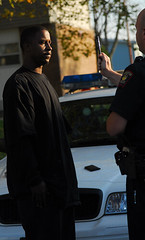 Many of the cases of intoxicated driving that I’ve written about include good examples of what not to do and what not to say if you’re pulled over for drunk driving. For example, telling the officer you’ve been drinking and popping pills all day is not the best idea. As a Massachusetts intoxicated driving defense attorney, I encourage people who are pulled over for drunk driving to not only keep in mind their rights, but to think strategically about what to say and do in order to ensure that the police report contains as little incriminating evidence against them as possible.
Many of the cases of intoxicated driving that I’ve written about include good examples of what not to do and what not to say if you’re pulled over for drunk driving. For example, telling the officer you’ve been drinking and popping pills all day is not the best idea. As a Massachusetts intoxicated driving defense attorney, I encourage people who are pulled over for drunk driving to not only keep in mind their rights, but to think strategically about what to say and do in order to ensure that the police report contains as little incriminating evidence against them as possible.
A police officer who pulls someone over probably already thinks that person is guilty — but they still have to collect enough evidence to legally show guilt. This is why police officers ask drivers questions about whether they have been drinking and how much, and request that they perform field sobriety tests and breathalyzer tests. Officers then record the details that they observe, the answers that drivers supply, and the results of field sobriety tests and breathalyzers in the police report, so that it can serve as evidence and they can refer to it when they testify in court against the drivers.
Many drivers don’t realize that even though police routinely ask them to take tests and answer questions, they cannot be forced to comply. You are not legally required to take a breathalyzer test, but there are consequences for refusing. If you’re over 21, you can lose your license for 180 days refusing to take a breathalyzer test. If you are later found not guilty or your case is dismissed, you can apply to the RMV for early reinstatement before the 180 days are up.
The same is not true for field sobriety tests, which you are free to refuse with no legal consequences in Massachusetts. Police officers’ interpretation of field sobriety tests is subjective, and the tests are difficult for sober people to perform correctly in relaxed settings, never mind for people who are nervous and standing on the side of the road, as I have written recently. Similarly, breathalyzers can also yield highly inaccurate results. Thus, it may better to deprive the police report of the police officer’s subjective evaluation of your performance of these faulty tests.
One of the biggest reasons to consider refusing to answer questions and taking the tests is that officers will record evidence that can be held against you, but are unlikely to record any evidence that exonerates you. Let’s say you had one drink but you’re not drunk. If your breath smells of alcohol, the officer will notice it, put it in the police report, and interpret everything else you do and say through that lens. You may not be able to stop them from noticing the smell of alcohol on your breath, but you can politely decline to answer questions about how many drinks you have had and where you have been, perhaps adding that you cannot answer any questions until you’ve spoken to a Massachusetts OUI defense attorney. Then, the officer may write in the police report that you refused to answer questions, but he or she will not be able to write that you admitted to drinking before driving.
If you do refuse to answer questions or take the tests, it’s extremely important to be polite and respectful about it. Do not challenge police officers’ authority or give them a bad “attitude.” Your goal is to avoid being charged with drunk driving, and making the officer angry does not help. It could also make the officer portray you more negatively in the police report and subsequent court testimony.
If you’re charged with drunk driving in Massachusetts, you need an experienced, aggressive Massachusetts drunk driving lawyer on your side. You should contact the Law Offices of Stephen Neyman for help. Based in downtown Boston, attorney Neyman represents people facing OUI and related charges throughout eastern Massachusetts. To discuss your legal options with an experienced attorney, please contact our office by email or call (617) 263-6800 today.
 Massachusetts DUI Lawyer Blog
Massachusetts DUI Lawyer Blog

